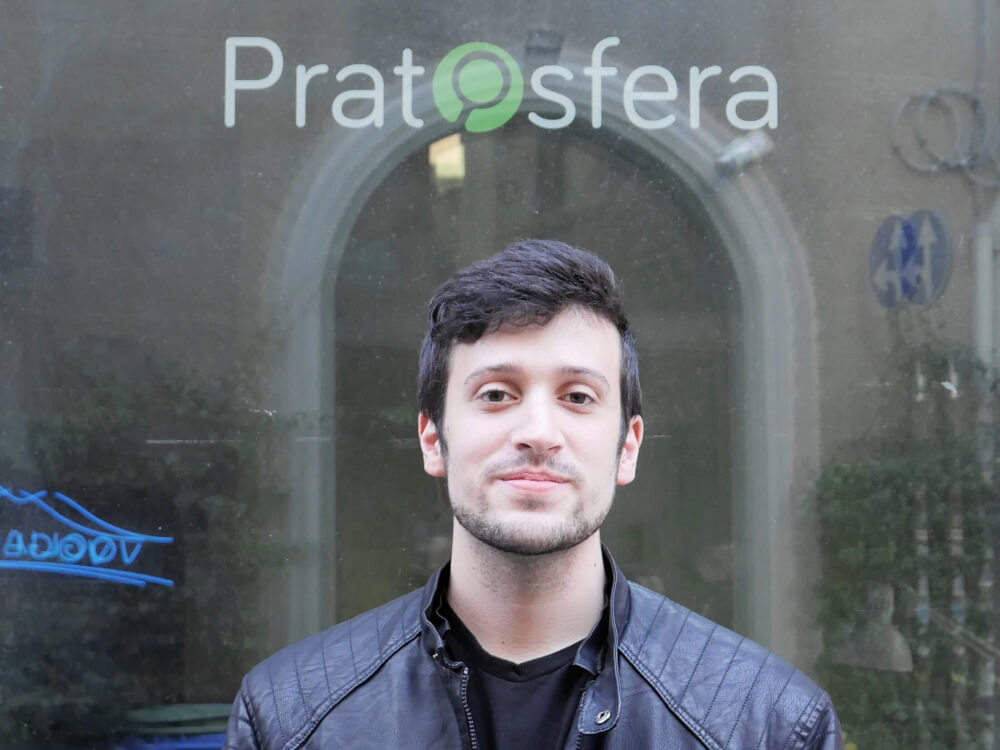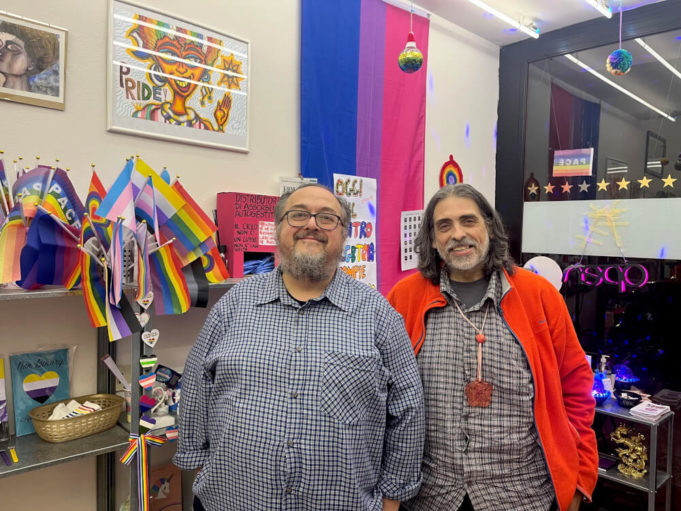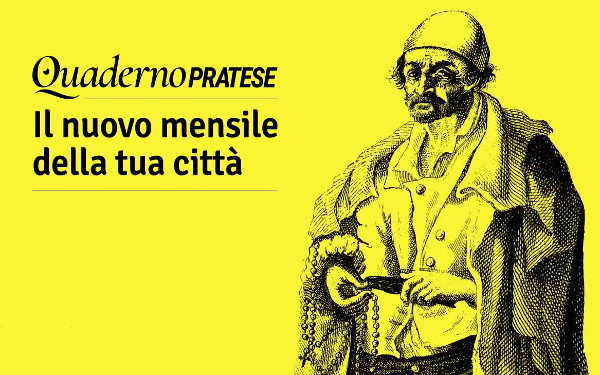Ogni giorno, mentre cammino verso l’università, vedo un’insegna che dice «Centro LGBTQIA+ di Prato», e quando passo il loro edificio di mattina, mi chiedo sempre quale sia il suo scopo. Per questo motivo ho fatto un’intervista con Marco Ravaioli ed Emanuele Bresci, i fondatori dell’associazione.
Prima della nostra intervista, ho ricevuto un invito da Ravaioli per parlare con loro, e dato che per Pratosfera confronto le differenze tra l’Italia e gli Stati Uniti, ero curioso di fare lo stesso con la comunità LGBTQ+ in Italia.
Secondo un opuscolo che mi hanno dato, l’organizzazione è stata creata nel 2005, ma è diventata un’associazione formale nel 2008. Come dicono nel loro opuscolo, la loro missione è usare il loro spazio per creare «un luogo di incontro, riunione ed elaborazione per tutte le persone che vogliono impegnarsi per una società più libera, contro ogni tipo di discriminazione ed esclusione».
Nonostante il loro piccolo spazio, ho scoperto che il loro impatto è grande. Poiché è ancora difficile essere nella comunità LGBTQIA+ a Prato, funzionano come uno spazio in cui la gente, giovane o vecchia, può parlare con qualcuno, che sia per un consiglio o solo un amico. All’inizia dell’intervista, abbiamo parlato su cosa fanno usualmente. Mi hanno detto che organizzano eventi, e danno il loro spazio a chiunque voglia realizzare il proprio evento. Nel posto in cui sono cresciuto, non c’era un posto come questo, e per questo motivo—per la maggior parte—la comunità LGBTQ ha dovuto nascondersi. Negli Stati Uniti, nelle città più grandi, questo non è un grosso problema, però nei piccoli paesi lo è, specialmente nei paesi più conservatrici.
Inoltre, abbiamo parlato della comunità trans a Prato. Ho realizzato che ci sono molte similarità tra le loro lotte qui e negli Stati Uniti. All’inizio dell’intervista, Ravaioli mi ha detto che «le persone trans e specialmente le persone trans ‘M to F’ [maschio a femmina] sono molte immarginate e sono ‘pushed’ verso il mondo della prostituzione.»
Tutto questo mi ricorda la realtà trans negli Stati Uniti, in cui molte persone trans sono coinvolte nella prostituzione. Il problema per la maggior parte non è che sono coinvolti nella prostituzione, ma che affrontano molti abusi, specialmente, le persone trans senza residenza legale. Ravaioli e Bresci mi hanno spiegato questo problema, specificamente, sull’argomento di ricevere la certificazione del cambio di genere. Su questo argomento, Ravaioli ha detto che «le persone straniere illegali sono fuori… non possono accedere [con l’ottenimento di una certificazione.]»
La stessa cosa succede negli Stati Uniti, in cui è molto difficile per le persone straniere illegali ottenere l’assistenza sanitaria di cui hanno bisogno perché non sono residenti legali. Continuando la conversazione sulla comunità trans a Prato e in Italia in generale, ho conosciuto il fenomeno del «mobbing», quale forma di intimidazione e violenza verso qualcuno in un posto di lavoro, per costringere quella persona ad andare via.
Per quanto riguarda il mobbing, e nel contesto della comunità trans, Ravaioli mi ha detto che «una persona inizia la transizione, e il datore di lavoro non può licenziare legalmente, però rende la vita così difficile a quella persona che alla fine questa decide di andare via.»
Quando confrontiamo questo fenomeno a quello negli Stati Uniti, succede la stessa cosa ma ad un livello diverso, soprattutto perché il sistema occupazionale è diverso negli Stati Uniti.
Dopo aver abitato qui per due mesi, sto ancora imparando del sistema occupazionale in Italia, ma ho capito che molti lavori qui, anche se per certi aspetti più difficili da ottenere, sono fissi, il che rende molto più difficile licenziare le persone. Negli Stati Uniti, invece, la situazione è un po’ diversa, quindi invece di mobbing, i datori possono semplicemente trovare un modo per licenziare i propri dipendenti. Negli Stati Uniti, si chiama questa parte delle leggi ” at-will employment ,” in cui un datore può licenziare uno qualsiasi dei suoi dipendenti, senza un motivo.
Ho imparato che questo non si può fare in Italia, per via delle protezioni dei dipendenti. Questo significa che il mobbing esiste negli Stati Uniti, ma i datori non lo usano come spesso fanno in Italia perché possono licenziare i propri dipendenti più liberamente. Inoltre, negli Stati Uniti sono state introdotte molte leggi anti-trans che depenalizzano la discriminazione nei confronti dei dipendenti LGBTQIA+, cosa dimostrata anche dalla differenza tra occupazione negli Stati Uniti ed in Italia per quanto riguarda la comunità LGBTQIA+.
Abbiamo parlato anche di altre difficoltà per la comunità LGBTQIA+ a Prato. Una di queste è la difficoltà di adottare bambini per le coppie gay. Mentre ci sono molti problemi per le coppie gay negli Stati Uniti per adottare bambini, è stato molto più difficile in Italia fino e ancora oggi è difficile per le coppie gay ottenere lo stesso riconoscimento legale delle coppie eterosessuali.
Mentre seguo la politica italiana, ho imparato che recentemente questo è stato un punto controverso, soprattutto a causa del partito di Giorgia Meloni e la sua posizione sulle “famiglie tradizionali”. Nel complesso, sebbene ci siano molte differenze tra le realtà LGBTQIA+ in Italia e negli Stati
Uniti, ho scoperto che non importa quanto possa essere difficile, la comunità LGBTQIA+ si assicura di prendersi cura l’una dell’altra, anche se ciò significa creare la propria famiglia e comunità. E sebbene ci siano molte sfumature dell’esperienza LGBTQIA+ in Italia che non capisco completamente, sono contento di saperne di più sulla comunità di Prato e di saperne di più su una risorsa così importante per la città.

Samuel Weinmann sta raccontando Prato dal punto di vista di uno studente americano in soggiorno in città. Segue spettacoli, concerti, incontra persone e poi ne scrive in italiano e in inglese. Leggi tutti gli articoli
Versione inglese
Every day, as I walk to my university, I see a sign that reads “Centro LGBTQ+ di Prato,” and each time that I pass their building, I always wonder to myself about their purpose and scope as an association. For this reason, I conducted an interview with Marco Ravaioli and
Emanuele Bresci, the founders of the organization.
Before our interview, I received an invited from Ravaioli to speak with them and given that I invariably compare differences between the United States and Italy for Pratosfera, I was curious to do the same for the LGBTQ+ community in Italy. According to a brochure that they gave me, the association was created in 2005, but officially became a formal association in 2008. As they said in their brochure, their mission is to use
their space to create “a meeting place dedicated to anyone who is committed to a freer society, against every type of discrimination and exclusion.”
Despite their small space, I learned that their impact is quite large. Because it is still very difficult to be in the LGBTQ+ community in Prato, they function as a space in which anyone, young or old, has someone they can speak to, whether that be for a piece of advice, or just for
a friend.
At the beginning of the interview, we spoke about what they usually do as an association. They told me that they organize events, and they give their space to anyone who wishes to hold their own event or activity. This reminded me of the town where I grew up, in which
there didn’t exist a place like this, leading many in the LGBTQ+ community to hide themselves. In the United States, this isn’t such a large problem for larger cities, but for small towns, it’s a much larger problem, especially for more conservative towns.
Furthermore, we spoke about the trans community in Prato. I realized throughout our conversation that there are many similarities between their struggles here versus in the United States. At the beginning of the interview, Ravaioli told me that “trans people, but especially
“M to F” trans people (male to female), are very marginalized, and are pushed toward the world of prostitution.”
This all reminded me of trans reality for many people in the United States, in which many trans people are involved in prostitution. The problem is not inherently their involvement in prostitution, but largely the vast number of abuses that they face on a daily basis. This abuse
and this violence is only magnified for those who don’t hold legal residence in the U.S. Ravaioli and Bresci explained the same issue to me in Italy, but specifically on the subject of receiving a gender-change certification. They told me that “undocumented individuals are left
out and cannot go forward [with gender change certification.]”
The same thing often happens in the United States, in which it is very difficult for undocumented individuals to get essential healthcare that they need, merely because they are not legal residents.
Continuing the conversation about the trans community in Prato in general, I learned about the phenomenon known as “mobbing,” which is a form of intimidation and violence toward those in a workplace to force them to quit.
Regarding mobbing, and in the context of the trans community, Ravaioli told me that it’s when a “person starts their transition, and because their employer cannot fire them legally, they make their life so difficult that in the end they decide to quit.”
While comparing this phenomenon to that in the United States, the same thing happens, but on a different level, mainly because the employment system is so different in the United States.
After having lived here for two months, I have started to learn about the employment system in Italy, and I have learned that many jobs here, despite being more difficult to get in many respects, are more fixed, which makes it incredibly hard to fire someone. In the United States,
however, the situation is a bit different, so instead of mobbing, employers can simply create a reason to fire their employees at their own will.
In the United States, this part of the law is called “at will employment,” in which an employer can fire any one of their employees without the need for a distinct motive.
However, as I have learned, you cannot do the same thing in Italy, due to employee protections–specifically, the “Just Cause” and “Just Motive,” parts of the law, which require more tangible reasons to fire employees. This meant that mobbing exists in the U.S., but employers don’t use it as often because they are more at will to fire their employees as they see fit. Furthermore, in the United States there have been many anti-trans laws that have been introduced, that intend to decriminalize discrimination of LGBTQ+ employees, which demonstrates very strongly the difference between employment in the United States and in Italy, regarding the LGBTQ+ community.
Finally, in addition to the trans experience, we spoke of other difficulties for the LGBTQ+ community in Prato; one of these is the difficulty for gay couples to adopt children. While there are many difficulties for gay couples in the United States to adopt children, it has been much more difficult in Italy until recently, and even today it is difficult for gay couples to get the same legal recognition as heterosexual couples.
As I have been following Italian politics, I have learned that recently, this has been a point of contention, especially with Giorgia Meloni’s party and their position on “traditional families.” In the end, although there are many differences between the LGBTQ+ reality in Italy and in
the United States, I have found that no matter how difficult it can get, the LGBTQ+ community makes sure to take care of one another, even if that means creating their own communities and families. And even though there are still many nuances of the LGBTQ+ experience in Italy that I have yet to understand entirely, I am still immensely grateful to learn more about the LGBTQ+ community in Prato and to learn more about such a vital resource for the city.







